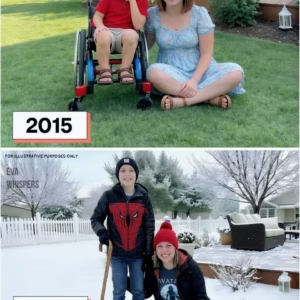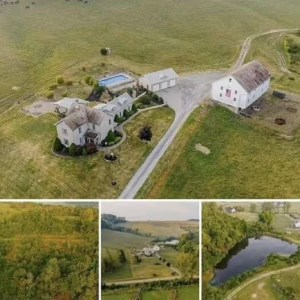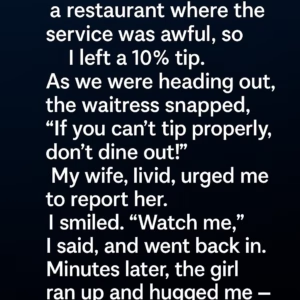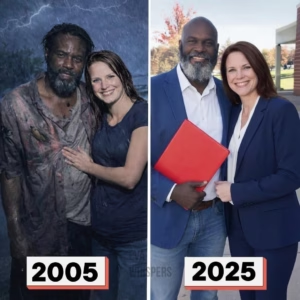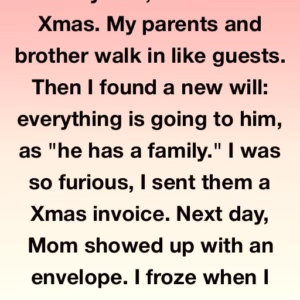I was seven the morning a dollhouse appeared on our porch, wrapped in yesterday’s newspaper like it had blown in on a quiet wind. My parents were as startled as I was. Dad decided it had to be a family friend with a soft spot and a workshop; Mom just kept touching the tiny windows as if they might be warm.
I believed in magic then, so I decided Santa did it—off-season, secretive, and a little mischievous. The house had a red roof, floral wallpaper no bigger than my thumbnail, and a backyard swing fashioned from a bent paperclip and string. I gave the rooms names and the teacups personalities. I grew up, the house didn’t. It lived on a shelf like a small heartbeat I could still hear if I stood very still.
Thirty years and a funeral later, Mom brewed tea and asked me to sit. Her hands wrapped the mug the way you hold something that might break. There was a weight in her eyes I had never seen.
“You remember the dollhouse?” she asked.
“Of course,” I said. “Uncle Ray, right? He was always tinkering.”
She shook her head and almost smiled. “No. It wasn’t Ray. It was someone else. Someone you never really knew.” She paused, drew a breath that sounded like the end of a long road. “It was your sister’s father.”
The room shifted. “My… what?”
“Before I met your dad,” she said softly, “I had a daughter. Her name was Claire. I was nineteen, broke, and convinced I could outrun judgment. Her father was kind but troubled, and when life got loud, he disappeared. Claire died when she was five. Leukemia.” Her voice thinned. “I buried that part of my life. I didn’t think I’d survive if I kept carrying it.”
I reached for her hand. Tears slid down her face and landed on the wood table like small, final sounds.
“Years later,” she went on, “when I was married to your father and you were little, a dollhouse arrived. No note. But I knew who made it. The wallpaper matched Claire’s baby blanket. He sent it for you. Maybe for her, too.”
Something in me opened and didn’t shut again. I went home and hauled the dollhouse from the attic. Dust sighed off the roof. The tiny chairs remembered where they belonged. I sat on the floor and stared like it was speaking a language I finally understood.
By morning I’d made a decision that felt less like a choice and more like an answer: I would find him.
I had almost nothing to go on—no name, no address, just “kind, a carpenter.” I combed public records, scrolled ancient forums where people still argued about dovetail joints, and fell into the quiet corners of the internet. Weeks later I found an old blog post—one photo, a dollhouse like mine, and a caption: “Built in memory of my little Claire.”
The blog listed a workshop in Oregon. I lived in Michigan. I booked a flight anyway.
The shop sat between a bakery and a bike repair place in a town that smelled like pine and fresh bread. Pine & Little, the sign read in easy cursive. Inside, sawdust and cinnamon shared the air. A gray-haired man leaned over a tiny rocking horse, humming.
“Excuse me,” I said. “I think you built me a dollhouse—about thirty years ago.”
He looked up, and whatever he was holding—breath, history—fell from his face. He walked around the counter, wiping his palms on a rag.
“You’re… her daughter,” he said.
I nodded.
His eyes filled. “I didn’t know if you’d ever find me.”
We talked for hours. His name was Martin. He had spent a lifetime sanding edges off small things and trying to do the same to grief. He never remarried. Never had other children. “After Claire,” he said, “some part of me went quiet.” The dollhouse was his way of sending love forward without permission. “I knew I had no right to step into your life,” he said. “But I wanted to leave something that might be good.”
“I loved it,” I told him. “It was my favorite place that wasn’t a place.”
He smiled, tired and bright at once. “Claire used to host tea parties for people only she could see.”
Before I left, I asked if he’d want to meet my mom. He hesitated like you do before opening a door you’ve knocked on for years. “If she’d be willing,” he said.
She was. Two weeks later they met at a café where the coffee was strong and the light was kind. It was awkward until it wasn’t. They spoke the way people do when they share a loss that doesn’t end, trading pieces of memory across a small table. Mom thanked him. He cried. Something soft returned to both their faces that I hadn’t realized was missing.
I started visiting Martin often. He taught me how to make tiny chairs that didn’t wobble and music boxes that surprised you on the third turn. One afternoon he pressed a little birdhouse into my hands. “Your turn,” he said. “Make something.”
Life, always humming under everything, moved forward. I married Tom in a ceremony we kept small on purpose. Martin came in a good jacket and watery eyes. His gift was a miniature of our home, every window straight, every shingle careful. I cried the way you do when something fits exactly where it should.
In the spring, a test strip turned pink. A girl. We named her Claire.
Martin passed when she was two—quietly, like a light you don’t notice has gone out until the room changes. He left me the workshop and a letter in his careful hand:
“Thank you for letting love find its way. What we leave behind isn’t always visible. But it matters.”
I turned his shop into a place where small hands could build big things. Free classes on Saturdays, coffee for tired parents, paint under everyone’s nails. We told stories while we glued and sanded, and I kept the dollhouse on a shelf by the door. When a child asked about it, I said it was a gift from a man who believed love could travel even when you never said a word.
Years later, my daughter and her friends knelt on the rug and arranged the tiny rooms. I watched her lean close and whisper to the people only she could see, and it felt like a circle closing without making a sound.
People ask if I wish I’d never known. I don’t. The truth didn’t break anything. It placed things where they belonged.
Because the dollhouse wasn’t just wood and paint. It was a second chance. A quiet act of love from a man who thought he had nothing left to give. Proof that sometimes the smallest, strangest gifts—left on a porch, wrapped in newspaper—are maps. If you’re holding something you don’t yet understand, don’t put it back in the attic. Keep it close. It might be leading you somewhere beautiful.
